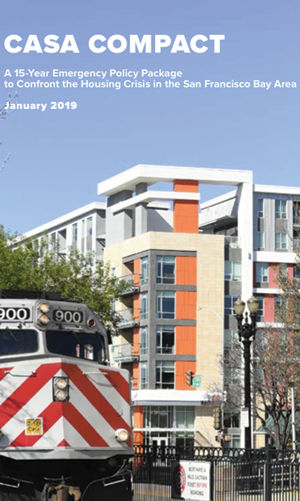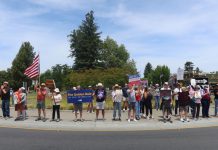The CASA Compact won’t have a welcome home in Healdsburg.
Mayor David Hagele will speak out against the CASA Compact at the next Mayors’ and Councilmembers’ Association of Sonoma County meeting on April 11.
Hagele represents the city at the joint meetings and will be taking direction from his fellow councilmembers after a discussion during the April 1 Healdsburg City Council meeting.
The city will also draft a letter in opposition to the compact that will be reviewed by Hagele before sent to the state.
“The intent for this is to demonstrate as a body of mayors and councilmembers to Sacramento that this is our stance,” City Manager David Mickaelian said of the night’s purpose. “And more specifically to the MTC (Metropolitan Transportation Commission).”
The CASA Compact is a 10-point policy plan that addresses the housing crisis in the nine county Bay Area and is likely to cost tens of billions of taxpayer dollars if fully implemented via new state-level legislation.
The compact is “pretty much a done deal at this point,” Hagele said, as he likened the compact to a guide book for the state legislature. “We’re in a position as a city, where it’s almost keep our head down and keep doing what we’re doing. And we are doing it right.”
The main problem councilmembers had with the plan was a lack of local control.
According to a staff report, the compact takes a one-size-fits-all approach to the housing crisis. In addition, the plan is narrow in its approach to housing, and limits implementation of broader plans.
“We are a city that’s doing it right and I don’t think we should be penalized for those that aren’t,” Hagele said.
“It’s really not going to benefit communities like ours,” Vice Mayor Leah Gold said. “It’s really tailored toward the larger Bay Area cities and we’re just getting dragged along like the tail wagging the dog.”
During public comment, one woman spoke up to say the city should take a step back and see how the city could be more involved in a regional approach.
“There are a lot of things in here that are exactly what we want to do,” Councilmember Shaun McCaffery said. “But there’s so many moving parts, especially the financing one, that how do we know that we’re going to pay into this and get anything out of this?”
Mickaelian said earlier that funding options for the CASA Compact had not been fully vetted.
Assistant City Manager Joe Irvin pointed out in his presentation that one funding option had already been ruled out as unconstitutional by legal counsel for the package. Another had been found too burdensome.
Councilmember Joe Naujokas said he saw the point of abuse of local power in other projects in the Bay Area, he also said some exception should be taken for cities like Healdsburg.
“Communities that have a BART station that don’t want to do multi-story units within walking distance of the BART station. It’s ridiculous,” he said. “That being said, I look at us, the RHNA acheivers, and we should get cut some slack.”
RHNA is the Association of Bay Area Governments’ Regional Housing Need Allocation.
Naujokas wanted a different definition of what regionalization means. He wanted to see what county allocations could be used for communities — such as Windsor and Healdsburg — to team up on housing projects that benefit both areas.
“I keep harping on the local preference,” Hagele said to the city’s language in new housing. “We’ve created our own micro-region.”
Councilmember Evelyn Mitchell said she looked into what other cities are doing and saw similar issues brought forth. She said that, like other councilmembers, she saw that Healdsburg has been addressing what the compact calls for.
“I don’t we need this bureaucracy of taking our money and sending it somewhere and maybe getting some of it back. And I’m not even sure how that is planned,” she said.
She added that there was a concern that it wasn’t clear how much the compact will cost the city.
The next council meeting will be on Monday, April 15, at 401 Grove St.









